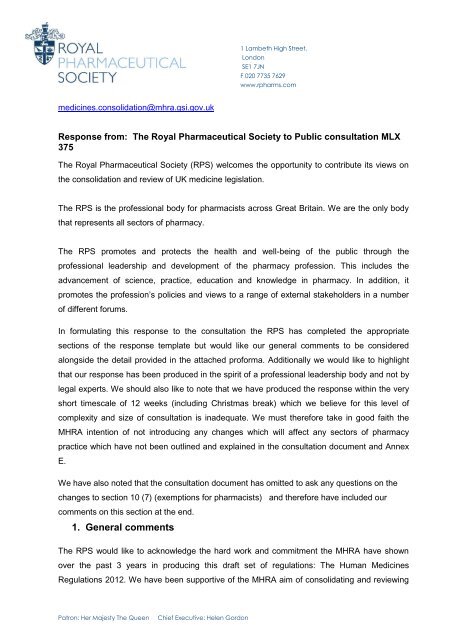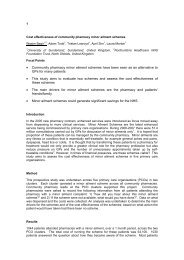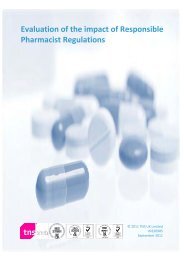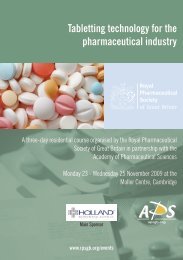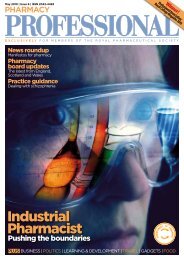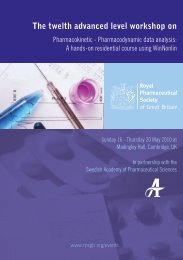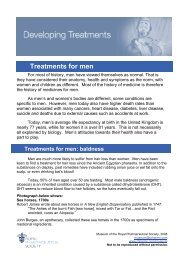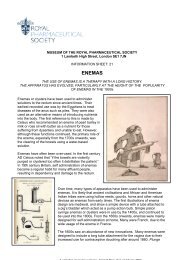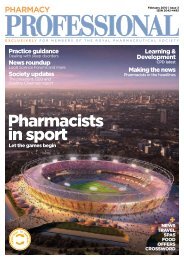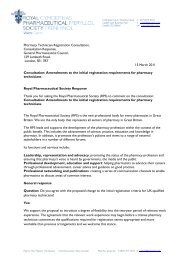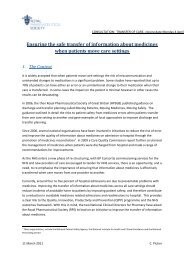Consultation response: The Royal Pharmaceutical Society to Public ...
Consultation response: The Royal Pharmaceutical Society to Public ...
Consultation response: The Royal Pharmaceutical Society to Public ...
Create successful ePaper yourself
Turn your PDF publications into a flip-book with our unique Google optimized e-Paper software.
1 Lambeth High Street,<br />
London<br />
SE1 7JN<br />
F 020 7735 7629<br />
www.rpharms.com<br />
medicines.consolidation@mhra.gsi.gov.uk<br />
Response from: <strong>The</strong> <strong>Royal</strong> <strong>Pharmaceutical</strong> <strong>Society</strong> <strong>to</strong> <strong>Public</strong> consultation MLX<br />
375<br />
<strong>The</strong> <strong>Royal</strong> <strong>Pharmaceutical</strong> <strong>Society</strong> (RPS) welcomes the opportunity <strong>to</strong> contribute its views on<br />
the consolidation and review of UK medicine legislation.<br />
<strong>The</strong> RPS is the professional body for pharmacists across Great Britain. We are the only body<br />
that represents all sec<strong>to</strong>rs of pharmacy.<br />
<strong>The</strong> RPS promotes and protects the health and well-being of the public through the<br />
professional leadership and development of the pharmacy profession. This includes the<br />
advancement of science, practice, education and knowledge in pharmacy. In addition, it<br />
promotes the profession’s policies and views <strong>to</strong> a range of external stakeholders in a number<br />
of different forums.<br />
In formulating this <strong>response</strong> <strong>to</strong> the consultation the RPS has completed the appropriate<br />
sections of the <strong>response</strong> template but would like our general comments <strong>to</strong> be considered<br />
alongside the detail provided in the attached proforma. Additionally we would like <strong>to</strong> highlight<br />
that our <strong>response</strong> has been produced in the spirit of a professional leadership body and not by<br />
legal experts. We should also like <strong>to</strong> note that we have produced the <strong>response</strong> within the very<br />
short timescale of 12 weeks (including Christmas break) which we believe for this level of<br />
complexity and size of consultation is inadequate. We must therefore take in good faith the<br />
MHRA intention of not introducing any changes which will affect any sec<strong>to</strong>rs of pharmacy<br />
practice which have not been outlined and explained in the consultation document and Annex<br />
E.<br />
We have also noted that the consultation document has omitted <strong>to</strong> ask any questions on the<br />
changes <strong>to</strong> section 10 (7) (exemptions for pharmacists) and therefore have included our<br />
comments on this section at the end.<br />
1. General comments<br />
<strong>The</strong> RPS would like <strong>to</strong> acknowledge the hard work and commitment the MHRA have shown<br />
over the past 3 years in producing this draft set of regulations: <strong>The</strong> Human Medicines<br />
Regulations 2012. We have been supportive of the MHRA aim of consolidating and reviewing<br />
Patron: Her Majesty <strong>The</strong> Queen<br />
Chief Executive: Helen Gordon
the UK medicine legislation. We accept that regulations by nature lack the detail of<br />
implementation and would request that where appropriate additional guidance is produced <strong>to</strong><br />
support the delivery of these regulations that the RPS is consulted at an early stage with<br />
regard <strong>to</strong> the impact they may have on the pharmacy profession.<br />
With regard <strong>to</strong> the pharmacy profession a set of consolidated regulations as a framework <strong>to</strong><br />
work within is a very desirable concept. Whilst we do not wish <strong>to</strong> diminish this achievement we<br />
are however concerned that a review of the regulations <strong>to</strong> ensure they are fit for purpose does<br />
not appear <strong>to</strong> have taken place. We believe this lack of review is a missed opportunity <strong>to</strong> align<br />
medicine legislation with the changing environment that health care is now delivered within and<br />
from, i.e. changes within the NHS structures, multiple legal entities with a hospital setting, the<br />
emergence of social enterprise models, out of hours services proved by private agencies and<br />
the ever changing technological advancements used <strong>to</strong> support the delivery of healthcare e.g.<br />
telemedicine, shared patient information. <strong>The</strong> process should also consider if the Definitions<br />
used within the Medicine Act are still valid and fit within the current view of how the service is<br />
delivered i.e. retail pharmacy business, retail pharmacy premise<br />
Additionally we are disappointed that the consultation does not cover some very important<br />
aspects of medicine legislation, namely the decriminalisation of dispensing errors, and provide<br />
the much needed clarity in respect <strong>to</strong> the role of the Superintendent Pharmacist and<br />
Responsible Pharmacist. We appreciate the assurance that these areas are intended <strong>to</strong> be<br />
addressed but would ask for greater clarity <strong>to</strong> the how, and when.<br />
Kind regards,<br />
Lindsey Gilpin Sandra Melville, Mrs Mair Davies<br />
Chair, English Pharmacy Board<br />
Chair, Scottish Pharmacy Board<br />
Chair, Welsh Pharmacy Board<br />
For further information or any queries you may have on our consultation <strong>response</strong> please<br />
contact Jocelyn Parkes Jocelyn.parkes@rpharms.com 029 2073 0311
Annex G – Response sheet<br />
Instructions<br />
If possible, please send <strong>response</strong>s electronically <strong>to</strong> medicines.consolidation@mhra.gsi.gov.uk using the following table. Even if<br />
you reply in hard copy, please use this table.<br />
If any of your answers refer <strong>to</strong> specific regulations in the draft consolidated regulations, please provide the regulation number<br />
and corresponding ‘j-number’ (this is shown in square brackets after the regulation number) in the relevant columns.<br />
Please provide any other observations in the second table below. Use one row per comment, and add more rows if necessary.<br />
Please also complete and return the confidentiality template at Annex H.<br />
Respondent details<br />
Please provide your details as requested below. <strong>The</strong> second and third pieces of information would assist us in delivering the<br />
Government’s commitment <strong>to</strong> engage with small, medium and micro businesses.<br />
Please provide your name and (if relevant) the organisation or body you represent: Jocelyn Parkes, <strong>Royal</strong> <strong>Pharmaceutical</strong><br />
<strong>Society</strong> , 1 Lambeth High street ,London, SE1 7JN, 020 7735 7629<br />
Please tick this box if you or the body you represent are in the NHS or public sec<strong>to</strong>r:<br />
If you represent a private sec<strong>to</strong>r company, please indicate the number of employees in the company by ticking the relevant box<br />
below:<br />
9 or less 10-49 50-249 250 or more x
Question<br />
Number<br />
Question Response Regulation<br />
number (if<br />
relevant)<br />
1 Are there any benefits<br />
and costs of<br />
consolidation other<br />
than those outlined in<br />
the impact<br />
assessment? If so,<br />
what are they?<br />
<strong>The</strong> RPS would like <strong>to</strong> acknowledge the hard work and commitment the<br />
MHRA have shown over the past 3 years in producing this draft set of<br />
regulations. With regard <strong>to</strong> the pharmacy profession a set of consolidated<br />
regulations as a framework <strong>to</strong> work within is a very desirable concept.<br />
However we are concerned that a review of the regulations <strong>to</strong> ensure they<br />
are fit for purpose does not appear <strong>to</strong> have taken place. We believe this lack<br />
of review is a missed opportunity <strong>to</strong> align medicine legislation with the<br />
changing environment that health care is now delivered within and from, i.e.<br />
changes within the NHS structures, multiple legal entities within a hospital<br />
setting, the emergence of social enterprise models, out of hours services<br />
provided by private agencies and the ever changing technological<br />
advancements used <strong>to</strong> support the delivery of healthcare e.g. telemedicine<br />
and shared patient information.<br />
J-number<br />
(if<br />
relevant)<br />
Additionally we are disappointed that the consultation does not cover some<br />
very important aspects of medicine legislation, namely the decriminalisation<br />
of dispensing errors, nor does it provide the much needed clarity in respect<br />
<strong>to</strong> the role of the Superintendent Pharmacist and Responsible Pharmacist or<br />
supervision. We appreciate the assurance that these areas are intended <strong>to</strong><br />
be addressed but would ask for greater clarity and accountability <strong>to</strong> the how,<br />
and when.<br />
<strong>The</strong> RPS acknowledges that a full review of 43 year old legislation is an<br />
onerous task but we believe the benefit of such a review outweighs any<br />
difficulties in undertaking the task. We would suggest that the review is split<br />
in<strong>to</strong> two, firstly a review of the legislation that is pertinent <strong>to</strong> medicine<br />
licensing requirements in respect <strong>to</strong> aligning the legislation within the context<br />
of EU legislation and secondly a review of the legislation pertinent <strong>to</strong> access<br />
<strong>to</strong> medicines and pharmacy.
Health and the implementation of health policy and strategy is a matter for<br />
the devolved governments but we believe overarching UK legislation should<br />
be written <strong>to</strong> support this implementation in all home countries. It is vital that<br />
the Medicine Act is not amended piecemeal <strong>to</strong> correspond <strong>to</strong> individual<br />
countries policy intent.<br />
In respect <strong>to</strong> cost of consolidation, any legislative changes will have a knock<br />
on effect on the people and resources that are used <strong>to</strong> teach educate and<br />
advise on the law. This effect cannot be articulated accurately as a financial<br />
cost but it must be acknowledged that the proposed changes outlined in this<br />
consultation will have a considerable resource, effort and cost by virtue that<br />
that teaching material, assessments, training, textbooks, advisory services<br />
and published guidance will have <strong>to</strong> be reviewed and updated <strong>to</strong> reflect the<br />
changes.<br />
2 What other evidence<br />
is there of the benefits<br />
and costs of<br />
consolidation for you<br />
or your organisation?<br />
3 Please review the<br />
sections relevant <strong>to</strong><br />
your industry and/or<br />
body and provide<br />
comments on the<br />
accuracy of our<br />
assumptions. In<br />
particular, we would<br />
like <strong>to</strong> know the<br />
following:<br />
3a Approximately how<br />
much time does your<br />
firm or body currently<br />
As above<br />
As above<br />
<strong>The</strong> RPS provides support, advice and leadership <strong>to</strong> its members. This<br />
includes advice on law and ethics and the impact of the law on their specific<br />
area of practice. <strong>The</strong> professional advice and guidance we provide <strong>to</strong> our
3b<br />
3c<br />
3d<br />
3e<br />
3f<br />
spend every year<br />
understanding the<br />
regulations as they<br />
are currently drafted?<br />
What change in this<br />
annual amount of<br />
time would you<br />
expect as a result of<br />
the consolidated<br />
regulations?<br />
Roughly how much<br />
time do you think your<br />
firm or body will take<br />
in familiarising itself<br />
with them?<br />
Where relevant, how<br />
much time do you<br />
estimate your firm or<br />
body will require <strong>to</strong><br />
alter your own<br />
guidance material in<br />
<strong>response</strong> <strong>to</strong> the<br />
consolidated<br />
regulations?<br />
What is the<br />
approximate wage<br />
rate of the staff who<br />
will engage in<br />
understanding<br />
regulations and<br />
revising guidance?<br />
members is based on the framework of the Medicines Act. Additionally we<br />
provide advice and information <strong>to</strong> a vast array of stakeholders on the<br />
practise of pharmacy. <strong>The</strong> sum <strong>to</strong>tal of time taken <strong>to</strong> amass this knowledge<br />
and understand the ramifications of the regulation is therefore extremely<br />
significant.<br />
As above<br />
As above<br />
As above<br />
As above<br />
Is our assumption that Most small and independent community pharmacy contrac<strong>to</strong>rs rely on their
small and micro<br />
businesses generally<br />
rely on their trade and<br />
professional bodies<br />
for regula<strong>to</strong>ry<br />
information correct?<br />
4 Do you agree with the<br />
structure of the draft<br />
regulations? Why, or<br />
why not?<br />
5 Do the draft<br />
regulations introduce<br />
any changes other<br />
than those outlined in<br />
this document?<br />
professional body <strong>to</strong> provide legal and ethical advice <strong>to</strong> support their daily<br />
practice. This advice is based on observations on legislation and our<br />
understanding of legislation. It is outside the scope of a professional<br />
leadership body <strong>to</strong> offer definitive legal opinion and in such cases members<br />
are referred <strong>to</strong> the General <strong>Pharmaceutical</strong> Council.<br />
However the RPS supports all of its members in understanding and working<br />
within the legal framework of the Medicines Act. Pharmacists work in many<br />
different practice settings in the NHS and in private health care and they<br />
seek individual advice from their professional leadership body on how the<br />
Medicines Act applies <strong>to</strong> their particular circumstance and working<br />
environment. This advice is provided within the scope of professional advice<br />
and not definitive legal opinion.<br />
We support the structure of the regulations which is logical, but as with most<br />
legal documents is not particularly user friendly <strong>to</strong> non-legally trained<br />
persons.<br />
J172 could be extended <strong>to</strong> place a manda<strong>to</strong>ry obligation on manufacturers <strong>to</strong><br />
give adequate notice of planned product withdrawals or anticipated<br />
shortages.<br />
As per general comments, we have drafted our <strong>response</strong> within a very<br />
limited timeframe for such a large complex document. We have focused our<br />
<strong>response</strong> on questions raised and have taken in good faith the MHRA<br />
intention of not introducing any changes which will affect any sec<strong>to</strong>rs of<br />
pharmacy practice which have not been outlined and explained in the<br />
consultation document and Annex E.<br />
We would ask that if any changes or drafting errors have been introduced,<br />
that the MHRA consults again on those issues and does not view a lack of<br />
input at this stage as being compliant with the change.<br />
Additionally we would ask for clarity on J203A , the wording now seems <strong>to</strong><br />
J172<br />
J203a
6 Are there any drafting<br />
errors in the draft<br />
regulations?<br />
7 Are there any<br />
provisions in the draft<br />
regulations that could<br />
be made clearer?<br />
8 What should we do <strong>to</strong><br />
help users prepare for<br />
the entry in<strong>to</strong> force of<br />
the consolidated<br />
regulations?<br />
suggest that the current sec 9 & 10 exemptions for radiopharmaceuticals<br />
would in future also include nurses. If this is the position we would not<br />
support this change.<br />
As above.<br />
9b: the word “prepared” appears in j203a.<br />
<strong>The</strong>re is a error on page 97 “relevant” not “relevent”.<br />
<strong>The</strong> drug name Amiodarone is misspelt in the document.<br />
We have made specific comments at the end of the <strong>response</strong> form.<br />
Legal documents are by nature often difficult <strong>to</strong> interpret by non-legal people,<br />
and as such the MHRA should consider issuing a lay explana<strong>to</strong>ry guide on<br />
new regulations, similar in nature <strong>to</strong> the guidance notes produced on the<br />
Veterinary Medicine Regulations <strong>to</strong> introduce a consistent approach.<br />
Additionally it should consult the relevant bodies including the RPS on what<br />
additional support guidance is needed <strong>to</strong> underpin the changes.<br />
As with any legislative change there must be sufficient time between the<br />
publication date and the implementation date, we would suggest at least an<br />
implementation time frame of 12 months for the proposed changed within<br />
this consultation. <strong>The</strong> MHRA could then use this lag time <strong>to</strong> run or fund a<br />
series of briefing events across the UK <strong>to</strong> cover key aspects of the legislative<br />
changes.<br />
J203a<br />
9a<br />
Should we add more<br />
requirements <strong>to</strong> Reg<br />
3 [j002B] for<br />
medicinal products<br />
No.
9b<br />
that fall outside the<br />
scope of the<br />
consolidated<br />
regulations? If so,<br />
what?<br />
We have replaced the<br />
term “prepared” that<br />
was used in a few of<br />
the exemptions in the<br />
Medicines Act 1968<br />
with “manufactured”,<br />
as we believe that<br />
term covers the<br />
making of any<br />
product. Do you see<br />
any difficulties with<br />
this?<br />
We do not support the change in terminology, as although it appears <strong>to</strong> be<br />
more relevant <strong>to</strong> EU legal directives, it will cause confusion for practise in the<br />
UK.<br />
In the working practices of the UK the word “manufacture” and “prepared”<br />
are interpreted differently and are not interchangeable.<br />
By removing the word “prepared” from the regulations there is a danger that<br />
the operations undertaken by or under the supervision of a pharmacist such<br />
as extemporaneous dispensing will be considered in the same legal<br />
framework as those undertaken by a licensed manufacture. This will lead <strong>to</strong><br />
unrealistic expectations and inappropriate standards being placed on<br />
practitioners with regard <strong>to</strong> simple dispensing exercises.<br />
9c Is the provision <strong>to</strong>o<br />
narrow or <strong>to</strong>o broad in<br />
any respect?<br />
10 Is the new definition<br />
of advertisement<br />
sufficient <strong>to</strong> cover all<br />
relevant forms of<br />
advertising?<br />
Additionally this change may cause confusion for those purchasing products,<br />
as they may think they are buying a product manufactured and tested<br />
according <strong>to</strong> current standards of EU GMP when in fact they are purchasing<br />
an extemporaneously prepared product made under the supervision of a<br />
pharmacist (e.g. in the case of a licensed specials manufacturer that is also<br />
a registered pharmacy).<br />
We would ask for clarity within this provision as <strong>to</strong> the position of dispensing<br />
doc<strong>to</strong>rs.<br />
We support the new definition of advertising, and would suggest that the<br />
activities of cold calling by telephone or spam / junk email are included in the<br />
definition.
11 Do you agree with the<br />
proposals for the two<br />
simplifications in<br />
relation <strong>to</strong> herbal<br />
medicines? Why, or<br />
why not?<br />
12 Do you agree with the<br />
proposal <strong>to</strong> remove<br />
the requirement <strong>to</strong><br />
dispense certain<br />
medicinal products in<br />
fluted bottles? Why,<br />
or why not?<br />
13 Do you agree with the<br />
proposal <strong>to</strong> remove<br />
statu<strong>to</strong>ry warnings,<br />
including for<br />
paracetamol? Why, or<br />
why not?<br />
14 Do you agree with the<br />
proposals <strong>to</strong> change<br />
We support the proposal <strong>to</strong> transpose the definition <strong>to</strong> “herbal medicinal<br />
product” as this appears <strong>to</strong> be a logical step <strong>to</strong> consolidate the regulations in<br />
this area.<br />
We are unable <strong>to</strong> comment on the second simplification as we have<br />
insufficient knowledge <strong>to</strong> know if this is a redundant provision <strong>to</strong> the Act.<br />
We support the proposal <strong>to</strong> remove the requirement for dispensing in<strong>to</strong> fluted<br />
bottles for certain medicines. <strong>The</strong> ability <strong>to</strong> acquire fluted bottles has been<br />
problematic as their use within pharmacy has diminished. Additionally they<br />
no longer offer any additional patient safety benefit as people do not<br />
understand the applied connotation of their use.<br />
Additionally we would suggest that the MHRA uses this opportunity <strong>to</strong><br />
introduce a manufacturing licence requirement for child proof packaging for<br />
all liquid preparations.<br />
We support the proposal <strong>to</strong> remove statu<strong>to</strong>ry warnings as they appear <strong>to</strong><br />
offer no additional patient safety benefit that cannot be achieved by the<br />
introduction of non-statu<strong>to</strong>ry warnings.<br />
We support any measures taken by manufactures <strong>to</strong> improve patient<br />
understanding of their medicines and would suggest that if new wording is<br />
suggested for warning labels the wording is reviewed by patient groups and<br />
professionals <strong>to</strong> ensure clarity and lack of ambiguity.<br />
In respect <strong>to</strong> the statu<strong>to</strong>ry warnings on paracetamol we support the flexibility<br />
on non-statu<strong>to</strong>ry warnings which can quickly accommodate any changes <strong>to</strong><br />
its indications. However in light of recent studies we are concerned about the<br />
removal of the statu<strong>to</strong>ry wording <strong>to</strong> the maximum daily dose, the warning for<br />
not taking other preparations containing paracetamol and that the medicine<br />
contains paracetamol and the quantity it contains.<br />
We support the proposed changes as it would enable the expertise of former<br />
members of the medicine advisory board <strong>to</strong> be used appropriate. Additionally
the persons<br />
appointed process?<br />
Why, or why not?<br />
15 Do you agree with our<br />
proposals <strong>to</strong> remove<br />
exemptions that are<br />
obsolete or no longer<br />
relevant? If not, why?<br />
the 1 year time frame seems an appropriate gap before taking up the post.<br />
We agree with the proposal <strong>to</strong> remove the provision that allows pharmacists<br />
<strong>to</strong> sell or supply Amyl Nitrate.<br />
However we do not support the removal of the provision which would relax<br />
restrictions on the sale or supply of medicines <strong>to</strong> people who are employed<br />
or engaged in connection with schemes for testing the quality and quantity of<br />
medicines supplied in the NHS on the basis that this provision is obsolete or<br />
no longer relevant. (Paragraph 9.4 of MLX 375)<br />
16a<br />
16b<br />
Do you agree with our<br />
proposal <strong>to</strong> extend <strong>to</strong><br />
other organisations<br />
concerned with<br />
research the<br />
provisions allowing<br />
sale or supply of<br />
medicines <strong>to</strong><br />
universities and<br />
institutions concerned<br />
with research or<br />
higher education.<br />
Why, or why not?<br />
If such a change were<br />
introduced, should it<br />
be subject <strong>to</strong> the<br />
exclusion of any<br />
NHS pharmaceutical quality assurance and quality control personnel<br />
continue <strong>to</strong> carry out testing of the quality of medicines supplied in the NHS<br />
and the current medicines act provisions should be retained.<br />
We have reservation about extending <strong>to</strong> other organisations concerned<br />
with research the provisions allowing sale or supply of medicines <strong>to</strong><br />
universities and institutions concerned with research or higher education.<br />
<strong>The</strong> organisations would have <strong>to</strong> be clearly defined in law, with a definitive<br />
list being available in the public arena for the profession <strong>to</strong> refer <strong>to</strong> when<br />
approached <strong>to</strong> make such a sale or supply.<br />
Additionally the supply should be through a named person / or job role within<br />
the organisation, <strong>to</strong> ensure a safe chain of supply and accountability for safe<br />
s<strong>to</strong>rage and cus<strong>to</strong>dy of medicines.<br />
We are unable <strong>to</strong> comment on the classes of drugs that should be available<br />
prior <strong>to</strong> knowing the details of the intended use and the other organisations<br />
referred <strong>to</strong>.
classes of medicines<br />
in addition <strong>to</strong><br />
controlled drugs?<br />
Why, or why not?<br />
17 Should the limit on<br />
the size of ampoule in<br />
which water for<br />
injection can be<br />
supplied be extended<br />
<strong>to</strong> 5ml? Why, or why<br />
not?<br />
18a Should the existing<br />
exemption allowing<br />
the administration of<br />
Adrenaline by<br />
injection by any<br />
person for the<br />
purpose of saving life<br />
in an emergency be<br />
amended <strong>to</strong> allow<br />
injection up <strong>to</strong> and<br />
including 1 in 1000?<br />
18b Should an increased<br />
range of Adrenaline<br />
preparations be<br />
subject <strong>to</strong> any<br />
limitations on the<br />
route of<br />
administration. Why,<br />
or why not?<br />
We support the recommendation <strong>to</strong> extend the size of ampoules in which<br />
water for injection can be supplied. <strong>The</strong> introduction of the 5ml ampoule will<br />
allow flexibility of supply, ease of administration and improved patient safety<br />
with the use of plastic rather than glass ampoules / containers.<br />
We support increasing the range of Adrenaline preparations available <strong>to</strong> be<br />
used in an emergency, however we have concerns that the wording “up <strong>to</strong><br />
and including” is <strong>to</strong>o vague, as this wording will allow inclusion of Adrenaline<br />
1 in 10000 which is an intravenous preparation that should only be used by<br />
experienced practitioners, and its inclusion would offer more risk than benefit<br />
for patients.<br />
We would also suggest a more generic wording <strong>to</strong> allow for brand changes<br />
and substitution if there is a supply problem.<br />
If the range of Adrenaline is increased, guidance should be issued <strong>to</strong> ensure<br />
patient safety is paramount and this should include appropriate route of<br />
administration, that the containers are clearly identifiable in strength and<br />
route of administration and that there is an auditable process in place <strong>to</strong><br />
minimise the risk of administration errors.<br />
Additionally if the range of Adrenaline is increased <strong>to</strong> allow the intravenous 1<br />
in 10000 preparation <strong>to</strong> be available then this should only be used by<br />
experienced practitioners in controlled situations where moni<strong>to</strong>ring is<br />
available (Ref BNF 3.4.3.).
19 Should Paracetamol<br />
and Ondansetron be<br />
added <strong>to</strong> the list of<br />
medicines that can be<br />
administered<br />
parentally by<br />
registered ambulance<br />
paramedics on their<br />
own initiative? Why,<br />
or why not?<br />
20 Should people be<br />
allowed <strong>to</strong> obtain<br />
water for injection for<br />
purposes other than<br />
parenteral<br />
administration without<br />
a prescription? Why,<br />
or why not?<br />
21 Should pharmacists<br />
be allowed <strong>to</strong> sell or<br />
supply water for<br />
injection without a<br />
prescription for<br />
purposes other than<br />
parenteral<br />
administration or for<br />
use as a dilutent<br />
where no dilutent has<br />
been specified by the<br />
prescriber? Why, or<br />
why not?<br />
We support the proposal for Ondansetron as it would allow greater access <strong>to</strong><br />
the medicine in a timelier manner; however we are concerned that the<br />
licensing agreement may not reflect its use in this circumstance.<br />
In respect <strong>to</strong> Paracetamol we are concerned that patient safety could be<br />
compromised for quicker drug access. Many patients take paracetamol<br />
routinely for pain and may have ingested their daily dose prior <strong>to</strong> the<br />
ambulance arrival, in a confused or vulnerable patient this information may<br />
not be conveyed <strong>to</strong> the ambulance paramedic and additional Paracetamol be<br />
given leading <strong>to</strong> a potential overdose.<br />
We support the proposal <strong>to</strong> extend the availability of water for injection. This<br />
would enable a pharmacist <strong>to</strong> use their professional judgement <strong>to</strong> supply<br />
sterile water that is required for other circumstances.<br />
Yes – as above.<br />
22 Should holders of the We would support the proposal <strong>to</strong> enable quicker or timely access <strong>to</strong>
Council’s Advanced<br />
Life Support (ALS)<br />
certificate be allowed<br />
<strong>to</strong> administer<br />
Adrenaline and<br />
Amiodorone in<br />
emergencies<br />
involving cardiac<br />
arrest? Why, or why<br />
not?<br />
23 Do you agree with the<br />
proposal <strong>to</strong> retain the<br />
general structure and<br />
requirements of<br />
PGDs in their current<br />
form, and <strong>to</strong> retain the<br />
principle that only<br />
registered health<br />
professionals should<br />
be able <strong>to</strong> use PGDs?<br />
emergency medicines.<br />
We would suggest that additional guidance is produced <strong>to</strong> ensure patient<br />
safety is paramount and the containers are clearly identifiable and auditable<br />
<strong>to</strong> minimise the risk of administration errors. Additionally the guidance should<br />
reflect medicine management issues such as s<strong>to</strong>rage and safe cus<strong>to</strong>dy of a<br />
POM.<br />
We support retaining the general structure and requirements of PGDs.<br />
PGDs have been a useful mechanism in allowing access <strong>to</strong> medicines,<br />
particularly in "see and treat" services e.g. emergency hormonal<br />
contraception / s<strong>to</strong>p smoking services. <strong>The</strong>re is clear evidence of patient<br />
benefit in continuing with this legal mechanism. But legislation must keep<br />
pace with the evolution of the health care environment <strong>to</strong> ensure that PGDs<br />
can be used appropriately <strong>to</strong> develop and deliver safe, effective services that<br />
comply with the law.<br />
<strong>The</strong>re is a need <strong>to</strong> urgently review some aspects of PGD legislation <strong>to</strong><br />
ensure that it is future proofed and fit for purpose in the ever changing health<br />
care environment. For example, the authorisation of PGDs can cause<br />
practical difficulties in changing NHS structures and urgent consideration<br />
needs <strong>to</strong> be given <strong>to</strong> how PGDs can be approved by healthcare<br />
organisations who are social enterprises. (See comment under 10.16)<br />
We would agree that prescribing on a one <strong>to</strong> one basis is the preferred way<br />
for patients <strong>to</strong> receive medicines. However, there has been lack of<br />
progress with the introduction of non-medical prescribing. This continues<br />
<strong>to</strong> cause barriers <strong>to</strong> service development and may lead <strong>to</strong> inappropriate use<br />
of PGDs as a result. <strong>The</strong>refore, this must be separately addressed.<br />
24 Should NHS bodies We support the supply of medicines in accordance with written directions
e able <strong>to</strong> supply<br />
medicines in<br />
accordance with the<br />
written directions of<br />
an independent<br />
nurse, pharmacist or<br />
op<strong>to</strong>metrist<br />
prescriber? Why, or<br />
why not?<br />
25 Should independent<br />
hospitals, clinics etc.<br />
in England continue<br />
<strong>to</strong> be allowed <strong>to</strong> use<br />
PGDs but by<br />
reference <strong>to</strong> them<br />
being registered for<br />
the following<br />
regulated activities in<br />
England?<br />
• treatment of<br />
disease, disorder or<br />
injury<br />
• assessment of<br />
persons under the<br />
Mental Health Act<br />
1983<br />
• surgical procedures<br />
• diagnostic and<br />
screening procedures<br />
• midwifery services.<br />
Why, or why not?<br />
26 Should dental<br />
practices and dental<br />
from non-medical prescribers as this gives equal legal prescribing rights <strong>to</strong><br />
non-medical prescribers. <strong>The</strong> wording does need future proofing or clarifying<br />
as there are currently proposals <strong>to</strong> extend prescribing rights <strong>to</strong> other<br />
healthcare professionals.<br />
We would however ask for more clarity on labelling requirements when<br />
supplies are made under this mechanism <strong>to</strong> ensure patient safety is not<br />
being compromised and a full audit trail is available.<br />
For English independent hospitals, clinics etc we support this proposal as<br />
the Health and Social Care Act 2008 (HSCA) has superseded the Care<br />
Standards Act 2000 and this is not currently reflected in PGD legislation.<br />
<strong>The</strong> use of PGDs in these regulated activities could help ensure timely and<br />
equitable access <strong>to</strong> the appropriate prescription only medicines by their<br />
patients in these settings.<br />
We would suggest that the MHRA should refer <strong>to</strong> the PGD website <strong>to</strong> help<br />
ensure that independent hospitals, clinics etc are aware of additional PGD<br />
guidance and resources <strong>to</strong> help ensure that PGD use is safe and legal.<br />
Health and the implementation of health policy and strategy is a matter for<br />
the devolved governments but we believe overarching UK legislation should<br />
be written <strong>to</strong> support this implementation in all home countries. It is vital that<br />
the Medicine Act is not amended piecemeal <strong>to</strong> correspond <strong>to</strong> individual<br />
countries policy intent. <strong>The</strong> Care Standards Act is still applicable in Wales,<br />
as many companies work across borders it is difficult <strong>to</strong> work within and<br />
especially uphold compliance with the differing legislation. As the Medicine<br />
Act is intended <strong>to</strong> be UK wide then we would request that the MHRA<br />
consults with the appropriate organisation in the devolved countries ie<br />
Healthcare Inspec<strong>to</strong>r Wales, and Health Improvement Scotland <strong>to</strong> gain UK<br />
agreement with such specific legislation.<br />
We support this proposal - as 25 above.
clinics registered with<br />
the CQC or private<br />
dentists registered<br />
with its equivalent in<br />
Wales be able <strong>to</strong> sell,<br />
supply or administer<br />
medicines under<br />
PGDs? Why, or why<br />
not?<br />
27 Do you agree with the<br />
proposal <strong>to</strong> facilitate<br />
the optimisation of<br />
medicines use? Why,<br />
or why not?<br />
28 Do you agree with our<br />
proposal for keeping<br />
the consolidated<br />
regulations up <strong>to</strong><br />
date? Why, or why<br />
not?<br />
We strongly support this proposal.<br />
This proposal would enable pharmacist <strong>to</strong> use their professional judgement<br />
<strong>to</strong> supply medicines <strong>to</strong> patients in a quick and efficient manner whilst acting<br />
within the prescriber’s intent and clinical indication. We understand that this<br />
change removes only the requirement <strong>to</strong> try <strong>to</strong> contact the prescriber and in<br />
no way changes the current position with regards <strong>to</strong> generic substitution<br />
As the professional leadership body we are happy <strong>to</strong> work with the MHRA in<br />
producing any underpinning guidance that is necessary <strong>to</strong> implement this<br />
proposal.<br />
We are supportive of the consolidated regulations and would suggest that<br />
the MHRA looks <strong>to</strong> review the Regulations <strong>to</strong> ensure they are fit for purpose<br />
in the every changing health care environment.<br />
From a professional stance a set of consolidated regulations are welcomed<br />
and we would request that they are regularly reviewed <strong>to</strong> ensure that all the<br />
medicine legislation is encompassed within one set of regulations.
Further comments (please use a separate row for each comment and insert more rows if necessary)<br />
Number Further comment<br />
4.21 <strong>The</strong> RPS is disappointed that section 10(7) of the medicines act is <strong>to</strong> be repealed but understand the<br />
reason for this is <strong>to</strong> bring the UK in line with European legislation.<br />
To meet the needs of specific patients, pharmacies have been able <strong>to</strong> provide small quantities of s<strong>to</strong>ck<br />
<strong>to</strong> other healthcare professionals for onward supply <strong>to</strong> meet patient need under section 10(7). Whilst<br />
we acknowledge that the MHRA have retained the general implications of this exception we would ask<br />
for clarity for the implied intention of the new wording within the exception. In particular we consider<br />
that pharmacists will need clarity about:<br />
How will ‘small quantities’ be interpreted by the Regula<strong>to</strong>r<br />
How will ‘occasional’ be interpreted by the Regula<strong>to</strong>r<br />
What is meant by a ‘single legal entity’<br />
Can NHS bodies still supply another NHS body on another site but within the same legal entity<br />
organisation e.g. large hospital supplying a smaller community hospital<br />
Can NHS bodies supply <strong>to</strong> non NHS bodies e.g. a hospital <strong>to</strong> a hospice, community pharmacy<br />
<strong>to</strong> care home, community pharmacy <strong>to</strong> prison pharmacy<br />
Can small supplies of s<strong>to</strong>ck be made in anticipation of need for, as yet, unidentified patients<br />
We would like pharmacies <strong>to</strong> have the ability <strong>to</strong> continue <strong>to</strong> supply <strong>to</strong> other agencies in a way that<br />
meets immediate patient need. We also understand and support the situation that after the repeal of<br />
10(7) supply <strong>to</strong> other agencies with the intent of further onward supply should be regulated as<br />
wholesale dealing.<br />
MHRA have indicated that professional guidance will be required <strong>to</strong> support the implementation of this<br />
Regulation<br />
number (if<br />
relevant)<br />
J-number<br />
(if<br />
relevant)<br />
J226
exception and the RPS offers its support and expertise in developing such guidance which, we expect,<br />
will clarify the issues identified above. This supporting guidance needs <strong>to</strong> be issued in a timely manner<br />
<strong>to</strong> enable those pharmacies currently using the section 10(7) exemption <strong>to</strong> change their working<br />
practice. Should this not be possible within the legal timescales, we would request that a “bedding in”<br />
period be declared by the MHRA so that current supply routes that would not fall within the guidance<br />
can find suitable alternatives through regulated wholesale supply.<br />
Packaging and package leaflets<br />
J602c<br />
<strong>The</strong> current provision <strong>to</strong> supplying patient information leaflets (PILS) with all medical products cause<br />
practical difficulties for pharmacy without corresponding benefit for the patient when making the supply<br />
through moni<strong>to</strong>red dosage systems(MDS) or multi-compartmental compliance aids (MCAs).<br />
We would ask that the MHRA considers the need for a more pragmatic approach when supply is made<br />
through an MDS or MCA <strong>to</strong> a patient who receives the medicine on a regular basis, particularly when<br />
they are in a residential care setting.<br />
<strong>The</strong>re is a practicality difficulty for the pharmacy in supplying PILS <strong>to</strong> regular MDS patients, in that they<br />
do not have enough PILs <strong>to</strong> send out on each occasion (weekly). We acknowledge that PILS can be<br />
printed from the internet “medicines.org.uk website.” However on a practical basis this is not ideal as<br />
not all PILs are available for printing and the quality of printed material can be variable.<br />
<strong>The</strong> supply of a PIL is also problematic within a hospital environment as the bulk s<strong>to</strong>ck for ward<br />
requires several PILs <strong>to</strong> be produced which may not be the most use friendly for the staff who require<br />
the information.<br />
Additionally for the patient and / or care homes there is a big bundle of paperwork that is supplied <strong>to</strong><br />
them which makes locating the right information when needed difficult and thus patients then tend <strong>to</strong><br />
throw away all the paper work. A sensible and pragmatic solution is required which continues <strong>to</strong><br />
provide information <strong>to</strong> patients regularly but without imposing excessive bureaucratic burden <strong>to</strong> the<br />
pharmacy and inconvenience <strong>to</strong> the patient without corresponding benefit.
Labelling<br />
Additionally we would ask that the MHRA considers a more flexible approach <strong>to</strong> the labelling<br />
requirement of MDS and in particular MCA which tend <strong>to</strong> be smaller in style and therefore more<br />
difficult <strong>to</strong> label appropriately. <strong>The</strong>se tend <strong>to</strong> be used more often by patients in the community requiring<br />
less support than those using MDS.<br />
<strong>The</strong> current regulations can cause practical and aesthetic issues in trying <strong>to</strong> attach full labels <strong>to</strong> these<br />
aids in accordance with the legal requirements. <strong>The</strong> end result can be difficult for both patients and<br />
carers, or other health professionals <strong>to</strong> read, which could have safety issues. Depending on the<br />
MDS supplied and the amount of tablets contained within the system it might be appropriate <strong>to</strong> label<br />
the MDS fully or where there is insufficient space, <strong>to</strong> label the MDS with basic information, such as<br />
name and quality of medication, and then supply the addition information and cautions on an<br />
accompanying card for the named patient or similar practice adaptation <strong>to</strong> suit the care setting.<br />
Emergency supply<br />
J527<br />
Currently it is not possible legally <strong>to</strong> make an emergency supply <strong>to</strong> a patient representative as the<br />
legal requirements state that the pharmacist must interview the patient. We would request this is<br />
reviewed <strong>to</strong> allow a pharmacist <strong>to</strong> use their professional judgement in making an emergency supply<br />
and act in the patient’s best interest. When an emergency supply is needed it is often requested by a<br />
parent / spouse / career and in these incidences the pharmacist should be allowed <strong>to</strong> use their<br />
professional judgement and act in the patient’s best interest <strong>to</strong> make the supply if needed and<br />
appropriate.<br />
Electronic prescribing /Faxed Prescriptions<br />
We would ask that the MHRA considers a change in wording within the legislation <strong>to</strong> accommodate for<br />
the increasing use of electronic means of producing / requesting a patient’s medicine.<br />
A small change in wording of the Act needs <strong>to</strong> be made <strong>to</strong> allow’ at the request of a doc<strong>to</strong>r’ <strong>to</strong> mean a<br />
written record transferred by fax or secure email as well, so that these supplies would then fall within<br />
the legal requirements of the Medicines Act.
In practice faxed prescriptions are a routine part of business for many pharmacies, especially at<br />
weekends when out of hours doc<strong>to</strong>rs do a consultation over the phone and fax a prescription <strong>to</strong> a<br />
convenient pharmacy, particularly in rural areas. Hospitals often fax NHS prescription forms for MDS<br />
patients <strong>to</strong> community pharmacies <strong>to</strong> allow enough time for the pharmacy <strong>to</strong> prepare the patients<br />
medicines in preparation for their discharge. In both examples the NHS prescription forms are posted<br />
<strong>to</strong> the pharmacy as the patient is usually housebound and the medicines delivered or picked up by<br />
carers. Additionally the prison service use faxed prescription as a means of obtaining supply from a<br />
central pharmacy hub with the original prescription being sent <strong>to</strong> cover the supply. <strong>The</strong>se practices<br />
offer practical solutions <strong>to</strong> patients in need of medicines and we would ask that the Regulations are<br />
changed <strong>to</strong> reflect this.<br />
Restriction on paracetamol quantities<br />
J502<br />
Currently the Medicines Act restricts the sale of paracetamol <strong>to</strong> the pack size of paracetamol. We<br />
would request that the MHRA reviews this and considers restricting the sale of paracetamol <strong>to</strong> <strong>to</strong>tal<br />
quantity sold in a single transaction. This change would s<strong>to</strong>p the practice of non pharmacy outlets<br />
selling multiple packs of the small pack of paracetamol and restrict the <strong>to</strong>tal qualities sold <strong>to</strong> any one<br />
individual.<br />
Collection points for medicines<br />
J516<br />
We are concerned about the application of J516 which could allow any registered pharmacy <strong>to</strong> setup<br />
multiple collection points (au<strong>to</strong>mated or otherwise) without restriction. Whilst collection points serve a<br />
legitimate purpose in some scenarios we would request that there are safeguards in place <strong>to</strong> ensure<br />
they form part of the overall pharmaceutical care needs of the patients they are intended <strong>to</strong> serve.<br />
Namely their introduction should be supported by a pharmaceutical needs assessment for their use,<br />
and ensure patient safety is not compromised when collecting their medicines. Additionally patients<br />
must have access <strong>to</strong> pharmaceutical advice when they collect their medicines.<br />
Patient Group Directions – views in advance of informal consultation<br />
10.16<br />
Organisational and structural changes in the NHS and PGD Authorisation<br />
We accept the need for a separate piece of work <strong>to</strong> review the legislation for authorisation of PGDs,
ut would ask that it is viewed as a priority by the MHRA.<br />
<strong>The</strong> shape of the new NHS commissioning and delivery landscape in England is rapidly evolving with<br />
some areas being far more advanced than others. Early pathfinder sites are now emerging with some<br />
expecting <strong>to</strong> be functioning as early as April 2012. <strong>The</strong>se sites could then gain formal accreditation by<br />
Oc<strong>to</strong>ber 2012, with the consequential knock on effect of PCTs in these areas being disbanded.<br />
In addition, the rate of establishment of Community Health Services across England who are social<br />
enterprises is increasing and many of these organisations rely on PGDs <strong>to</strong> deliver their services e.g.<br />
family planning and sexual health clinics. <strong>The</strong>se organisations currently rely on PCTs <strong>to</strong> authorise<br />
PGDs on their behalf.<br />
10.17<br />
10.19<br />
Pharmacy<br />
We note that the issue of adding pharmacy technicians <strong>to</strong> the list of health professionals who can use<br />
PGDs requires more detailed consideration which cannot be completed within the timescales for the<br />
consolidation and that the MHRA will progress this separately. We would suggest that the MHRA<br />
should at the same time consult on the need <strong>to</strong> add other registered health professions <strong>to</strong> this list <strong>to</strong><br />
ensure that the list reflects needs across all healthcare provision .e.g. registered operating department<br />
practitioners.<br />
Unlicensed medicines<br />
Whilst we agree that in principle unlicensed medicines should not be supplied/administered under a<br />
PGD, there is a one notable exception, Tuberculin PPD (Man<strong>to</strong>ux test). Tuberculosis services all use<br />
the unlicensed Man<strong>to</strong>ux , and as such have <strong>to</strong> use Patient Specific Directions (PSDs) not PGDs as a<br />
means of supplying the test. <strong>The</strong> use of PSDs is not appropriate in this instance as it is not always<br />
possible for prescribers <strong>to</strong> individually assess each patient and we would therefore ask for either an<br />
impact assessment on the decision not <strong>to</strong> change the law or a licensed product should be made<br />
available so that practice could take place under PGD and safer systems of work could be<br />
implemented.<br />
Schedule 7 Qualified Persons<br />
J005<br />
We would ask the MHRA <strong>to</strong> consider including the experience under a manufacturing specials licence<br />
<strong>to</strong> count <strong>to</strong>wards QP training as this would allow more QPs <strong>to</strong> be trained and retained in the NHS. This
may include changing the wording in part 1 of Schedule 7 from authorised <strong>to</strong> licensed. A hospital<br />
pharmacy holding a Specials licence is 'licensed', but not authorised i.e. it has a manufacturing<br />
specials licence (MS) not a manufacturer’s authorisation (MA). At the moment NHS candidates<br />
generally have <strong>to</strong> rely on experience under a manufacturer’s authorisation for investigational medicinal<br />
products (MIA(IMP)) <strong>to</strong> fulfil the practical experience criterion and it is hard for candidates <strong>to</strong> obtain this<br />
experience.


